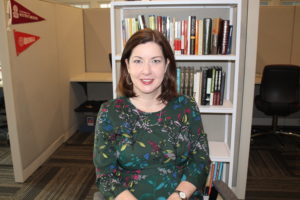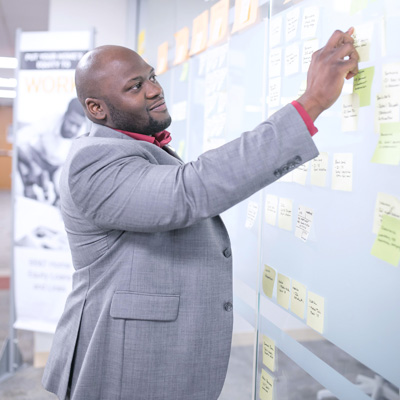By Ameera Steward
The Birmingham Times
Micah Green-Holloway is a rarity in the world of education: a college graduate who is debt-free.
That feat was achieved with the help of Alabama Possible, a nonprofit organization that works with 330 high schools across the state to equip educators and the community with the ability to acquire resources and establish relationships in support of post–high school educational pursuits.
“[The organization] taught me how to write essays; writing was a really big thing. [It also helped me] meet a lot of different people in Birmingham, so I made a lot of connections [and] broadened the people I now have in my network. … It was a huge blessing,” said Green-Holloway, a 24-year-old first-generation college graduate from Birmingham’s Gate City area.
Green-Holloway graduated from Woodlawn High School in 2013 and Samford University, where he earned a degree in business management and marketing with a concentration in sports marketing, in 2017. He now lives in North Carolina and is a project manager in the corporate marketing department for BB&T Corp.
“I would love for other students to experience the opportunity I had,” said Green-Holloway. “It’s really incredible and has allowed me to live a life of freedom … after college. It’s also put me in a position to … give back to others. I couldn’t do that too well if I hadn’t graduated from college debt-free.”
Reaching Out

Alabama Possible Executive Director Kristina Scott said her organization welcomes students like Green-Holloway.
“Our door is open to anyone that calls and needs help filling out the [Free Application for Federal Student Aid (FAFSA) form] or dealing with college paperwork,” Scott said. “Our primary work involves reaching students and families where they are, and that’s primarily in high schools. … In a world of limited resources, we really are trying to be … smart and strategic about how we deploy those to support better outcomes across the state.”
The FAFSA form determines a student’s financial aid eligibility, including loans, grants, and work-study opportunities; some colleges also use it to determine scholarship recipients. Each year, the FAFSA process opens on October 1; this year, applications will be accepted through April 1, 2020. Students are encouraged to complete the applications as soon as they can to qualify for the maximum amount of financial aid.
Alabama Possible partners with the state department of education on College Application and Financial Aid Form campaigns, as well as College Signing Day, “where every student can celebrate their plans for life after high school,” Scott said.
“And when we talk about college, we mean two-year, four-year, technical, or academic programming,” she added. “My goal is to have every student—regardless of whether they’re from Mountain Brook, Vestavia, Hoover, Homewood, Ensley, Woodlawn, Smithfield, or any other area—to have the resources and relationships they need to pursue their dreams.”
Identifying Needs
Alabama Possible conducts monthly webinars on topics that school counselors and career coaches identify as needs among their students. The organization also hosts in-person workshops, tracks data for high schools, sends out weekly emails, and offers incentives to school counselors for their good work.
“As a nonprofit organization that’s outside the structures of … bureaucracy, we are able to be nimble and … respond quickly to what our educators tell us they need in order to be successful,” Scott said.
For example, some educators told Alabama Possible they need to be able to talk about the financial aid form during instructional time, so the organization created a lesson plan that allows students to complete financial aid forms during class as an extra-credit or graded project.
“We want to support people in the field who have access to students and families to help them navigate through [the process],” Scott said.
Cash for College
Alabama Possible’s Cash for College campaign is one way of navigating the financial aid process. One big reason students don’t get money for college is because they don’t complete the financial aid forms or they miss college priority deadlines. The Cash for College campaign encourages Alabama high schools to rally around FAFSA completion. Sixty percent of Alabama public high school graduates will qualify for a full or partial Pell Grant, which is money that doesn’t have to be paid back.
“Filling out the FASFA is not going to solve all the problems, but it is step one in the going-to-college journey. Filling out the financial aid form and doing so before the school’s priority deadline [provides] a better understanding of financial aid offers [and helps students make] the best choices,” Scott said. “It’s a way to get information as soon as you can so you can have a conversation with your family about … what [going to college] is going to look like.”
The Alabama Possible College Application campaign starts the last week of October and runs through November 1. During this time, students can apply to college without paying admission fees; it’s also a time when schools organize themselves around post–high school plans. The organization’s College Signing Day takes place around May 1.
“We celebrate every student and their plans for life after high school,” Scott said. “Whether they’re going to be an electrician, a welder, or follow a premed track, … every student’s pathway should be celebrated.”
Pathways to Success
The college-prep process begins with every student having an understanding of their skills, aptitudes, and interests to understand the jobs available in their fields of choice, so they can take classes that will not only prepare them but also help them find educational pathways to set them up for success.
“It’s OK to constantly reexamine what you want to do and make adjustments as you go along,” Scott said. “You have to understand yourself and what you want to do. You have to be brave about not being a doctor or a lawyer or a teacher because that’s what other people want you to do. … Maybe the biggest thing you can do to prepare yourself is to learn to be resilient, to recognize barriers and navigate your way around them, and to realize that that’s part of the learning process.”
Green-Holloway took those instructions to heart as he was preparing for college. In his sophomore year of high school, a recruiter got him involved with Alabama Possible while helping him seek and register for different scholarship, grant, and essay-competition opportunities.
“The FASFA was the biggest thing by far that helped me out a lot,” he said, adding that ACT prep helped him learn how to take standardized tests, as well as better understand the material before heading to college.
“Have an open mind,” Green-Holloway said. “Don’t settle on one school. Look at a multitude of schools, and don’t settle on one too fast. … Look at things outside of just the education the school can provide. [Consider] what do you want to do afterward and see if the school is conducive to helping you advance in your career.”
To learn more about Alabama Possible, visit alabamapossible.org. To schedule an appointment for Cash for College, call 205-939-1408 or email info@alabamapossible.org.
Click one of the links below to read more stories about College Prep.
The Education of Jay Johnson, Founder of College Prep U
Wenonah High’s Justin Smith Found His Passion Through Ed Foundation
With Help From College Choice Foundation, Ramsay Grad now a Yale Scholar





